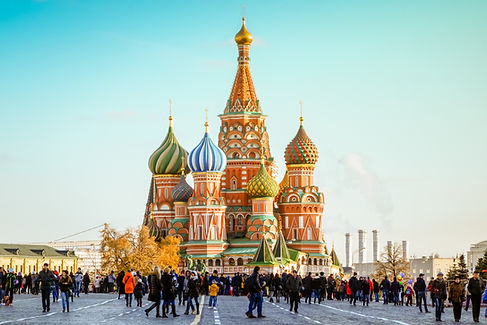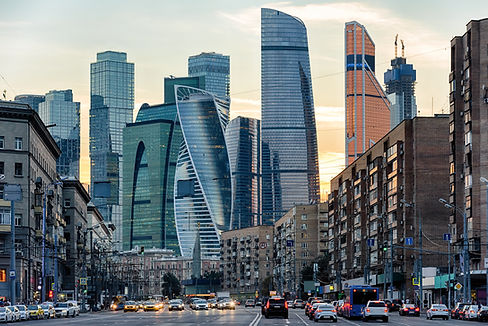+79100000143 - Russia
+919626281306 - India

Why should study in Russia?
Russia, or the Russian Federation, is a country spanning Eastern Europe and North Asia. It is the largest country in the world by area, extending across eleven time zones and sharing land borders with fourteen countries. It is the world's ninth-most populous country and Europe's most populous country. Russia is a highly urbanised country including 16 population centers with over a million inhabitants. Its capital as well as its largest city is Moscow. Saint Petersburg is Russia's second-largest city and its cultural capital.
6 Reasons to study in Russia

1. HIGH QUALITY EDUCATION
In Russia, students can obtain fundamental knowledge in a wide range of interesting areas and specialties. Moreover, Russian universities boast centuries of tradition and vast experience;, particularly in working with foreign students. In fact, the first foreign applicants began enrolling at Russian universities in the late 19th century.
Every year, over 300,000 students from around the world enroll in Russian universities — and this number only continues to grow. People around the world trust the high quality of the Russian education system, which is why Russia remains one of the most popular destinations for foreign students.
Over 37 thousand Doctors of Science and 136 thousand Candidates of Science are employed as highly qualified professors and members of the teaching staff in universities throughout the country. Business figures are actively involved in the implementation of educational programs to ensure a practice-oriented approach to learning.
Thanks to numerous state-supported programs, the continuous improvement of the Russian educational system remains a top government priority and students across the country can avail of cutting-edge technology and digital tools throughout their educational career.
Russia is a recognizedworld leader in educating mathematicians, physicists, chemists, geologists, engineers, programmers, and medics, as well as specialists in other natural sciences. Moreover, Russian universities place highly in numerous international rankings, such as the ARWU (Academic Ranking of World Universities), QS World University Rankings, and THE World University Rankings.
2. A BROAD RANGE OF EDUCATIONAL PROGRAMS
Today, there are 741 universities in the Russian higher education system, including 29 national research universities, 10 federal universities, and two universities with special statuses: Moscow State University and Saint Petersburg State University.
With more than 400 fields of study and subject areas that range from mathematics and natural sciences to arts and culture, there's a place for everyone at a Russian university.
Students of all education levels can choose from over 650 specialties in bachelor’s, master’s, specialist’s, postgraduate (residency, adjunct training), assistant internship and internship programs in Russia. Russian universities also offer pre-university preparatory programs to help prepare foreign students for bachelor's, specialist’s and master's degrees, short-term programs (summer university, a semester in Russia, summer schools), foreign language programs, and additional education programs, such as professional retraining and professional development.


3. WORLD-CLASS EDUCATION AT AN AFFORDABLE PRICE
Tuition costs in Russian universities are significantly lower than in the USA, Canada, or United Kingdom. Despite these low prices, the Russian education system is highly respected around the world.
In 2024, tuition at Russian universities for full-time undergraduate programs began at 90000 roubles per year ($1000), depending on the major. The most prestigious universities in Moscow can charge up to 700000 roubles ($7800) per year.
The cost of education varies considerably across the country, and tuition costs in the regions are generally much lower than in the capital. As a result, students can save a significant amount of money by choosing a regional university outside of Moscow or St. Petersburg. Moreover, the 82 regions across Russia provide a wide range of unique opportunities, with universities everywhere from Kaliningrad to Vladivostok.
Russia is one of the few countries that offers foreigners the opportunity to study for free at the state’s expense. In 2024, 15,000 state scholarships were allocated for foreign nationals in Russian universities. Foreign students are also allowed to take part in university Olympiads. Winners and medalists of these competitions are given preferential admission to leading Russian universities.
4. STUDENTS ACCOMMODATION & LOW COST LIVING
Most universities provide accommodation for their students, so applicants won't need to worry about rushing to find housing in their new country. Accommodation in student residences is either free or extremely cheap compared to European prices. Nevertheless, student living conditions in Russian universities can compete with any other campus in the world. Many student residences have several different styles of accommodation: rooms for one, two, or three people, as well as family units.
All in all, the cost of living in Russia is lower than in Europe or North America. For example, a kilogram of apples will cost EUR 2.43 in France and EUR 1.37 in Greece, but only EUR 0.74 in Russia. Thanks to the favorable rouble exchange rate, this difference is especially striking for students coming from countries that use dollars or euros.


5. ADAPTING AS AN INTERNATIONAL STUDENT
Modern Russia is a mix of Asia and Europe, and a place where everyone can find a little piece of home. Throughout history, Russia has bordered a wide variety of nations and peoples, absorbing their traditions and values. This has resulted in amazing ethnic and cultural diversity within the country. Russia is now home to more than 200 ethnic groups who speak over 100 different languages and dialects.
Moreover, freedom of religion is guaranteed in the constitution. People of all faiths, including Christianity, Islam, and Buddhism, coexist peacefully in every city across Russia. In Saint Petersburg alone, you'll find churches, cathedrals, mosques, synagogues, temples, and houses of worship for 42 faiths.
This unique diversity allows students from absolutely anywhere to feel comfortable in their new country and easily adapt to student life.
6. A VIBRANT STUDENT LIFE
Life for students in Russia far exceeds the four walls of the classroom. There are plenty of ways to spend your free time, get to know other students, make new friends, and learn new things.
Every Russian university has its own theater groups, sports teams, and volunteer organizations. Throughout the year, countless youth festivals and fairs take place across different Russian cities, welcoming students not only as spectators but also as active participants. For example, you might talk about your country and national traditions at a celebration for the Days of National Cultures.

